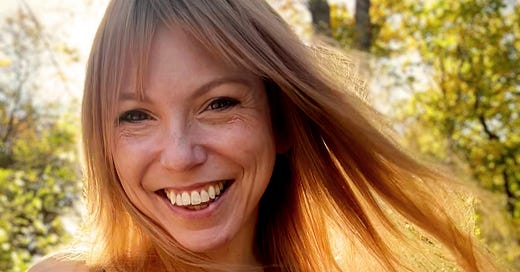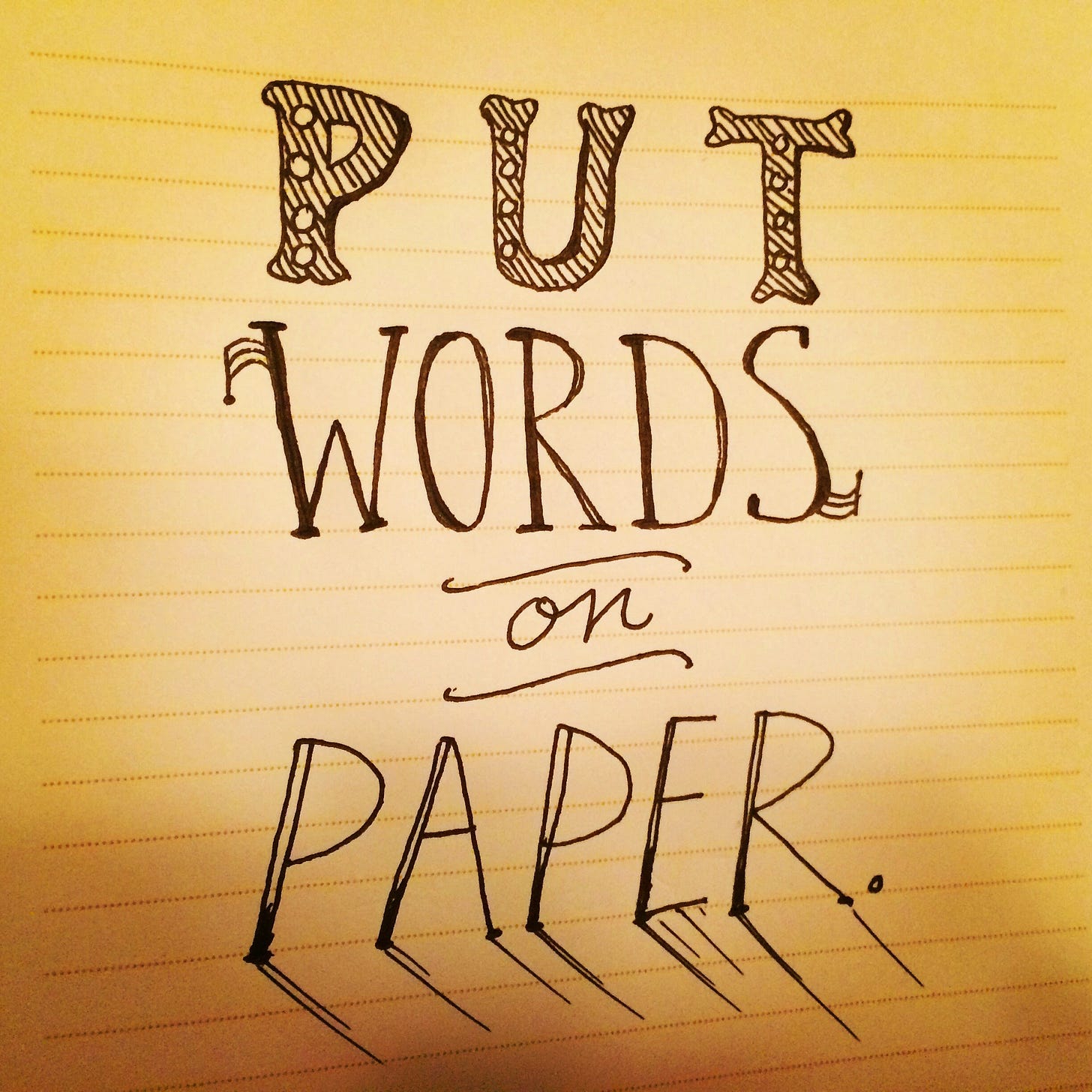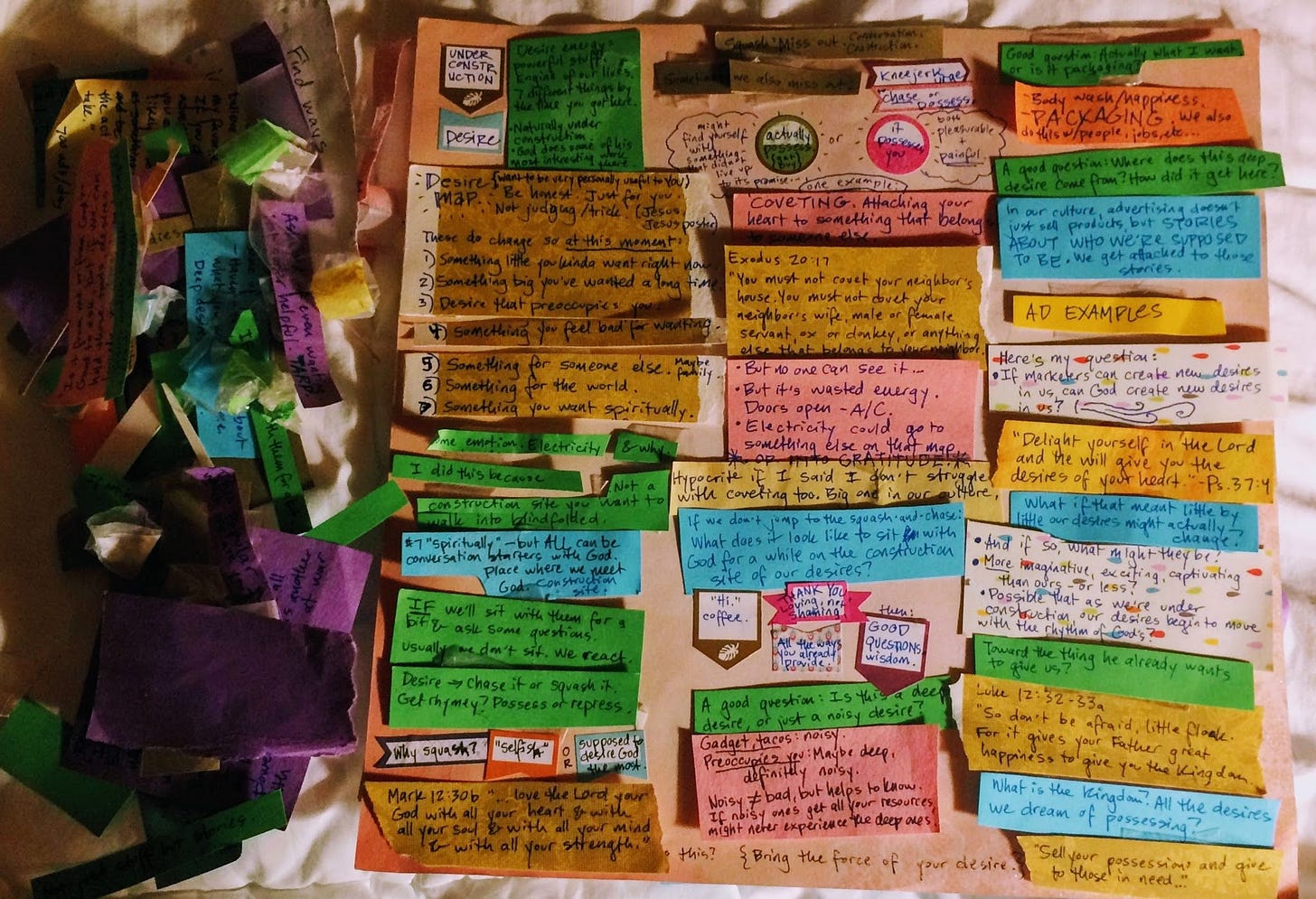“be open for the moments of pleasure”
🧜🏼♀️⚡author and musician June Gervais on listening with her whole being, leaning into the pleasure of creative practice, and seducing herself back to the work 🧜🏼♀️⚡
This is a Beginner’s Mind interview, a series that explores the intersection of mindfulness and creative practice. Zen master Shunryū Suzuki Roshi said, “In the beginner’s mind, there are many possibilities; in the expert’s mind, there are few.” This series shines a light on the practices that sustain people in their daily lives and open the path to new possibilities. If you know (or are) a writer, creative person, mindfulness teacher or practitioner with practices you’d like to share, just reply to this newsletter to be in touch with me. Subscribe below to make sure you don’t miss any future interviews. 📓🙏🏼✨
In my most vivid memory of June Gervais, she’s on stage at the Bennington student center, viola in hand, performing “Poison and Wine” with Eli Burrell. I remember all of us holding our breath in the dark, transfixed by their harmonies. (Denton Loving just shared this video of this very performance!!!)
June is a multi-talented creative force. Her debut novel, Jobs for Girls with Artistic Flair, is keeping me company on our road trip to the Grand Canyon this week and I’m completely lost in the world she created. I’m sneaking in reading time anywhere I can to keep following the story of awkward misfit Gina Mulley, who dreams of becoming a tattoo artist. But in 1985, tattooing is almost entirely male and she has multiple obstacles on her path to achieve her dream. I keep laughing aloud as I read, which is often awkward in public, but really delightful.
This interview is full to the brim with wisdom from June about what to do if you’re stuck, leaning into the pleasure of creative practice, and seducing yourself back to the work. She also shares a brilliant prompt to try if you’re overwhelmed by a project or task. 🧜🏼♀️⚡
What are your writing/creative practices? Do you have any rituals or habits that help you?
My best kept secret is reading a few pages of a randomly selected book from my shelf while eating a slice of pie. Any kind: pecan, rhubarb, cream. Preferably baked by a local grandfather, but I have resorted to Marie Callender’s in a pinch.
I have not actually tried that. I just needed to say something other than “spending time outside” and “reading books, in general” and “writing consistently, even when I don’t feel like it” and “lighting a candle, quieting myself, and trying to tune into that guidance that feels like a faint radio signal,” all of which are true, but not original.
These days I’ve been leaning into walk-and-talks—I make phone dates with faraway artist/writer friends and then I walk for miles while we talk about our projects, or art-making in general, books we’ve read, ideas we’re mulling over. This has been life-giving for brain and body and spirit.
What are your mindfulness practices?
I try, on my best days, to listen to people with my whole being—to be fully present with them, and pick up cues about what’s important to them, and ask questions in that direction. This springs from rampant curiosity (people are so interesting) but also love.
What I mean is: Most of the time, I walk around feeling secretly strange, which makes me grateful to anyone who’s ever listened deeply enough, and asked the right questions, to understand me. This is also what I want to do for others. It’s such a fundamental way to love and honor the person in front of you, to affirm that what they say is worth understanding and remembering.
Do you have a mantra or motto related to your creative/mindfulness practices/life? What piece of wisdom do you have on a post it note to help you remember it?
Re: life: There’s a character in my first novel who isn’t me, but has some things in common with me, and at one point—realizing she’s in a toxic situation that she needs to leave—she reflects: “How you spend your days is how you spend your years is how you’ve spent your life.” I gave her that thought because it guides me, too. One day I’ll wake up and it will be my deathday. A certain number of mornings and afternoons are left between today and that day, and I can’t know the number, but I know it’s not ∞. So however I spend them, I want to do it on purpose.
Re: writing: “Put words on paper” has often worked for me, but getting my second novel onto paper was so challenging that I had to think up a new one.
This new book feels more ambitious and risky than my first: It’s playing with genre-bending, it has an unconventional framing device, etc. My critical inner voice kept saying What if you can’t pull this off? What if it doesn’t work? So I started repeating: “I am keeping a promise to myself.” That promise was I’m going to finish.
When I shifted my focus to the promise, instead of this daily interrogation of my skill or the project itself, the doubts were less relevant. They were not authorized to cancel my writing session for the day.
What helps you when you get stuck with your creative/writing or mindfulness practices?
Writing-wise, my stuckness is often rooted in overwhelm. When this happens—facing a major round of revisions, for example—my go-to practice is making posters.
These posters look sort of like paper quilts assembled from spellbook scraps and Pantone swatches. In truth, they are glorified to-do lists that break down large, daunting goals into smaller tasks.
I start by writing down everything I need to do on small pieces of paper:
Figure out a better structure for Chapter 44
Draft the scene where Meg is visited by the Georgian-speaking ghost-woman
Research environmental effects of dry-cleaning spills
Then I arrange these scraps on posterboard in a way that pleases me. I’ll play with lettering, paint, collage. My goal is to make something beautiful enough that I want to look at it—sort of seducing myself back to the work. The process itself is also helpful: the pleasure of making something with my hands, the meditative state, getting a handle on what needs to be done.
If the stuckness is particularly stubborn, sometimes I need to reimagine the writing process itself. Instead of grinding on miserably, is there another mindset I could try? Other methods? I ended up writing the entire first draft of my second novel by hand—over four hundred pages—in an ancient-looking, handmade journal. The tactile nature of the process unlocked something for me.
Do you see your creative and mindfulness practices as connected? In what ways?
Yes. Yes. Yes.
For over a decade I’ve been taken by these lines from Katy Didden’s poem “Pleasure Milker”: “You’re the kind who stands still / in front of awful things and squints / as though you could see into / the god chambers of every atom in every / drop of water…” I want to be that kind, too. I mean—that is a wild ideal, a zenith of seeing, we can’t do it all the time. But we can practice.
In order to tell truths about the world, or even about a single conversation, I have to be quiet and present enough not only to see it in detail, but to see into it.
How have creative and/or mindfulness practices helped you in your life?
I was first diagnosed with major depression at fourteen, was twice hospitalized as a teenager, and I have struggled with it ever since, which I think would surprise most people. You can’t tell from talking with me casually or following me on social media. I laugh a lot (it’s real laughter) and connecting with people brings me flashes of joy (also real), but there are whole seasons of life, months on end, where almost everything is hard for me and it feels very dark.
Creative practices—particularly making small things, like poems, or handmade objects like a mosaic, a chalk drawing, decorative lettering—provide some relief. And although mindfulness doesn’t lift the depression, it’s helped me observe myself like a scientist to see what helps (travel, exercise, sunlight) and what doesn’t (sugar, avoiding tasks, deep talks after 10 pm).
Mindfulness also helps me protect the people around me—to name what’s happening instead of letting it govern my actions unthinkingly. To say to my children, for instance, “I know you’ve seen me crying today and I might seem irritable, but it’s not because of you and there’s nothing you need to do about it. I’m not feeling good, but it will get better.” And then to turn my attention outward and ask them, “What happened in your day? How are you feeling?”
What advice would you give someone who is trying to start or restart a creative or mindfulness practice?
When you do your practice—whatever it is—be open for the moments of pleasure, and notice and feel them.
A short catalog of my writing pleasures, for example:
· Sometimes when I’m writing fiction, some remote part of my brain hands me a weird, funny sentence and I laugh out loud.
· When I finally write something that I’ve been avoiding, it feels good to have it out of my skull and on paper instead.
· Sometimes the pleasure comes after the writing—like a post-workout feeling, fatigued but also refreshed.
· When I’ve been fiddling with a poem for an hour, and I suddenly realize that I’m happy and my mind is pleasantly quiet, I receive that as a gift and am thankful for it.
Making note of your own specific pleasures may be helpful. When I do this, I find myself wanting to write again, because I remember that something about it felt good. And when you do a thing again and again, you have a practice.
Similarly, if certain habits are crowding out your writing time, notice how you feel when you’re doing them. I rarely watch TV because it usually makes me feel empty inside, or stressed out. (No judgment on TV for those who like it! It’s just not my favorite thing.) I want to do things that make me feel alive.
A Prompt from June 🎨⚡
Perhaps try my poster method? It might help if you’re overwhelmed by a task—figuring out the plot of a book, organizing an essay, planning a workshop—and you need some clarity.
Whatever’s floating around in your head (ideas, phrases, plot events, things to do, questions to solve, etc.), write each thing down on a small piece of paper.
Then physically play around with them. Try grouping and ordering them in different ways. Use art supplies if that helps. (I love these Antiquarian Sticker Books.) See if connections emerge.
As you play, you may start to see part of the big picture, but not all of it. That’s fine. It’s enough clarity to get started. It’s like you’ve received Page 1 of an Ikea manual. (I feel more confident when I pretend I’m receiving instructions. Some higher Storyteller understands all this; assembly is inevitable; one day my creation will be as functional as a Scandinavian kitchen cart.) If you follow the Page 1 instructions and build the part you understand, it may clarify Page 2.

June Gervais’s debut novel, Jobs for Girls with Artistic Flair (Penguin Books), is the coming-of-age story of a young queer woman chasing her dream of becoming a tattoo artist in the 1980s. It’s been called “delicious” (The New York Times), “thoughtful and tender” (Booklist), “original, immersive, and wholly alive” (Kirkus Reviews). June’s poems, essays, stories, and book reviews have appeared in Lit Hub, Writer’s Digest, The North American Review, RHINO, Big Fiction, The Missouri Review, Sojourners, The Common, Cordella, and elsewhere. She holds an MFA from the Bennington Writing Seminars and is a frequent guest speaker at bookstores, libraries, and schools.
More from June
June’s novel Jobs for Girls with Artistic Flair is available at all the usual outlets, but her favorite is Bookshop.org to support indie bookstores. (Or if you request it from your local indie bookstore, they may start carrying it, and some reader who’s been craving a fun, uplifting, sweetly queer novel will have their wish granted.)
June’s novel is also an audiobook (Penguin Random House Audio), narrated by award-winning voice actress Jesse Vilinsky.
Follow June on Instagram (@june.gervais.writer) and Bluesky (@junegervais.bsky.social) for upcoming workshops/events and occasional musical mischief.
To arrange a classroom, bookstore, or library visit, or book June for a workshop/lecture (in person or virtual), email june.gervais.writer@gmail.com.
For high school teachers and beginning writing workshops: Check out June’s website for a fun illustrated handout of the tools fiction writers use.

What You May have Missed on Be Where You Are
The next Ass in Chair Collective on Mon, April 21st is open to anyone! Below are the details from the last one w/the link for the 21st!👇🏼
Before you go, will you take one moment to hit the LIKE button or leave a quick comment? This one simple action is incredibly effective at helping to spread the word about these interviews & what’s happening here at Be Where You Are 🌱 Be Where You Are is 100% reader-supported. You can support this work by becoming a paid subscriber for 5$ a month or make a one-time donation here if you value this work but can’t subscribe right now. Or, just send it to a friend! 📓🙏🏼🩵
Be Where You Are is a newsletter about how to use writing and mindfulness to live more fully where you are. If you have ideas to share for future newsletters, you can reach me by replying to this email. I’d love to hear from you! You can also find me on Instagram/Facebook/Bluesky or find more info at my website.










Excellent interview! I just requested June's novel from the library :)